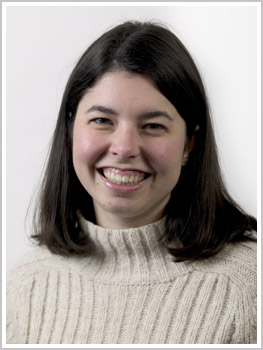 |
|
Contact InformationEmail: rfrasert@bates.edu |
Education
- B.A., Drew University, 2000
- M.A., Cornell University, 2003
Research Interests
Prof. Fraser-Thill's main area of recent research has concerned infant development, particularly in the domain of social development. She has also performed research on parents' decision making about care for their child with autism, eyewitness identification (accuracy on lineups and mugshots), suggestibility to false information, and the prosocial behavior of cancer patients' siblings.
Courses Taught
- Psyc 101 Principles of Psychology
- Psyc 235 Abnormal Psychology
- Psyc 240 Developmental Psychology
- Psyc 242 Child Psychopathology
- Psyc 340 Infancy
- Psyc 341 Advanced Topics in Developmental Psychology
- Psyc s35 Psychology and the Media
Selected Publications
* indicates Bates student
Lahti, M., Connelly, R., Nigro, G., & Fraser-Thill, R. L. (2009). Working parents and child care: Charting a new course for quality. Maine Policy Review, 18(1), 94-104. (link to article in PDF format)
*Wiechnicki, E., & Fraser-Thill, R. L. (2008, April). Inoculating witnesses against the negative effects of co-witness information. Poster presentation at the annual meeting of the Eastern Psychological Association, Boston, MA.
*Begim, A., & Fraser-Thill, R. L. (2007, October). Novelty and familiarity preferences for infant-directed singing. Poster presentation at the annual meeting of the New England Psychological Association, Danbury, CT.
*Helliesen, M., & Fraser-Thill, R. L. (2007, October). From buzzing confusion to jealousy and empathic concern: Reexamining emotional and social development in infancy. Poster presentation at the annual meeting of the New England Psychological Association, Danbury, CT.
Fraser-Thill, R. (2007). Study Guide to accompany Psychology: Concepts and Connections (8th Edition). Belmont, CA: Thomson/Wadsworth.
Dean, A., Fraser-Thill, R., Gallik, P., Nigro, G., & Walshe, A. (2006). Supporting Maine's infants & toddlers: Guidelines for learning & development. Maine Department of Health and Human Services. (link to article in PDF format)
Bradfield, A., Smith, C., & Fraser-Thill, R. (2005). A problem with double-blind photospread procedures: Photospread administrators use one eyewitness's confidence to influence the identification of another eyewitness. Law and Human Behavior, 29(5), 543-562.

